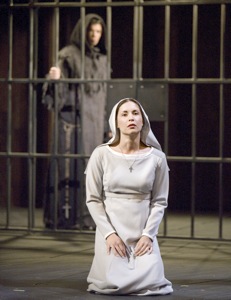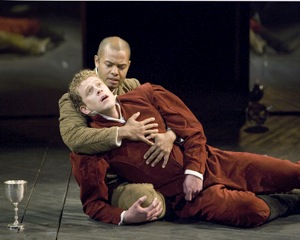-
- Teen claiming homophobic bullying found guilty of murder
- Gay, lesbian students rush to Arizona State Greek life
- Acting surgeon general says he feels no political pressure
- First domestic partner registry starts in Kansas
- Judge urges McGreeveys to settle divorce case, sets trial date
- National News Briefs
- World News Briefs
Arts & Entertainment
The Old Globe Shakespeare Festival
Published Thursday, 09-Aug-2007 in issue 1024
This year’s Old Globe Shakespeare Festival offers the early comedy Two Gentlemen of Verona, the late tragedy Hamlet (Shakespeare’s longest and arguably the best play ever written in the English language) and the even later Measure for Measure, all played out on Ralph Funicello’s tri-level, multipurpose set. The plays run in repertory through September 30 on the Lowell Davies Festival Stage. For tickets call (619) 23-GLOBE or visit www.theoldglobe.org.
Matt August directs Two Gentlemen of Verona, Festival artistic director Darko Tresnjak is at the helm of Hamlet and Paul Mullins directs Measure for Measure.
Two Gentlemen of Verona
Love and adventure, the adventure of love, love for money, love and betrayal – themes Shakespeare would revisit in successive plays are explored here in the early Two Gentlemen of Verona.
Inspired by Portuguese writer Jorge de Montemayor’s1542 prose romance Diana Enamorada, Shakespeare’s comedy contains conventions and situations he will use again in later plays, and takes place in Montemayor’s three worlds: that of lovers subject to parental approval; the sophisticated court in Milan; and the green and natural world of the forest.
The titular characters are young men – Proteus (Corey Sorenson) and Valentine (Ryan Quinn), good friends with differing views on life. Proteus, wildly in love with Julia (Joy Farmer-Clary), feels love is all that matters, while for Valentine seeing the world is the most important thing.
They both end up not only in Milan, but in love with the duke’s lovely daughter Silvia (Stephanie Fieger). Julia ends up there too, when she disguises herself as a page and travels to Milan to see what Proteus is up to. He’s up to betrayal, but all ends well. Along the way, early Shakespearean stock characters like Proteus’ man Launce (Jonathan McMurtry, in rare form, waxing loquacious about his new love: “She hath more qualities than a cocker spaniel”) and his dog, Crab, Valentine’s loquacious servant Speed (Sam Breslin Wright) and the well-named (and well-costumed) Mistress Overdone (Celeste Ciulla) amuse.
Director Matt August has decided to spice up the somewhat ineptly written court scenes by adding orgiastic activity and outrageous satiny costumes in brilliant (yea, even blinding) jewel colors. It’s fun for a while, but familiarity does breed contempt (in more ways than one), and this particular shtick wears out its welcome pretty early on.
August also introduces puzzling innovation in the look of the brigands who abduct Valentine. They come in two visual flavors. I couldn’t decide whether one group is supposed to look like trees, moose or deer. The others are wearing big fur snoods that make them resemble slugs.
August’s quartet of young lovers is up to the task of portraying both the giddiness of young love (Julia and Proteus) and the more reasoned, somewhat more mature version (Valentine and Silvia).
Two Gentlemen of Verona is not the “problem play” that Measure for Measure is, but it poses its own difficulties in presenting a comedy that is mostly silly in nature with an attempted rape. But August pulls it off in convincing fashion.
Measure for Measure
Political and personal corruption have never been rare commodities, and Measure for Measure forces a disquieting consideration of both.
Never shy about borrowing sources, Shakespeare seems to have combined the plots of three ancient folktales in Measure for Measure: “The Corrupt Magistrate,” “The Disguised Ruler,” and “The Substituted Bedmate.”
The play opens with the dispirited Vincentio, Duke of Vienna (Tom Hammond), handing off authority temporarily to his friend Angelo (James Knight), hoping his more hardheaded friend will be able to clean up the licentious behavior common in the city due (he thinks) to lax law enforcement. Vincentio leaves courtier Escalus (Charles Janasz) as adviser to Angelo. Meanwhile, Vincentio steals off to conceal himself in a priest’s habit and watch what happens.
Turn-of-the-20th century Vienna (director Paul Mullins has moved the time frame forward) is rotten, perhaps as rotten as Hamlet’s Denmark, but rather than introducing a sufficiently tragic figure to purge it, Shakespeare leaves his characters to muddle through as best they can.
Angelo demonstrates his inflexibility right off by condemning Claudio (Rhett Henckel) to death for impregnating his girlfriend Juliet (Carolyn Ratteray), despite the fact that this was a love match and marriage was the intention of both parties. (That Angelo committed the same infraction will become known later.)
When Claudio’s sister, the novice nun Isabella (Stephanie Fieger), pleads for her brother’s life, the implacable (but corruptible) Angelo suggests that she can save Claudio’s life by yielding to him. Indignant, she visits Claudio with the proposal and is shocked when her brother suggests she give in. Sometimes, Shakespeare suggests, virtue can be a vice.
A little trickery brings Angelo to a just end with one of Shakespeare’s oft-used multiple wedding scenes, but this play still leaves at least this viewer uncomfortable about the fickleness and venality of mankind.
Along the way, Shakespeare provides comedy in the persons of the fop Lucio (Lucas Hall) who gets trapped in his own lies, and Globe stalwart Jonathan McMurtry as the prisoner Barnardine, whose drunkenness keeps him from the gallows – terrific performances both. The word-challenged Constable Elbow (Sam Breslin Wright) and Overdone’s servant Pompey add more comic touches.
Everyone in this cast turns in a solid performance. Hammond’s Duke is human and likable, acting incognito as a sort of stage manager until the end, when love touches him too.
Knight’s Angelo, is unmovable in his severity and fondness for capital punishment (until he, too, gets caught), is perfect.
Fieger is lovely and strong as Isabella, and does as well as any I’ve seen to interpret a character that could be seen as just plain too prissy.
Mullins’ direction is generally crisp, but he could stand to drop the two slow-motion entrances that only serve to distract.
Measure for Measure is about extremes: The Duke is too lax, Angelo too unbending, Isabella too self-righteously virtuous, Barnardine too drunk, Lucio too absurdly licentious. But in the end, all find that the middle road may serve them better.
Hamlet
Approaching any of Shakespeare’s plays is a daunting proposition, but nothing can be quite so challenging as presenting the Bard’s masterwork, Hamlet.
Darko Tresnjak, now in his fourth year as artistic director of the Old Globe Shakespeare Festival, takes on the melancholy Dane for the first time as part of the 2007 summer series, alternating with Two Gentlemen of Verona and Measure for Measure.
It’s always thrilling to watch a Tresnjak-directed show. An intelligent and imaginative director, his interpretation of a play is never quite like anyone else’s, his visual magic always distinctive. Hamlet does not disappoint on these grounds. It’s the characterizations that differ most from other productions, and not always in a good way.
The story is that the young prince Hamlet (Lucas Hall) has returned from university at Wittenberg for the funeral of his beloved father and the nearly immediate remarriage of his mother Gertrude (Celeste Ciulla) to his uncle Claudius (Bruce Turk). When he’s told by watchmen and also by his friend Horatio (Ryan Quinn) that his father’s ghost is making late-night appearances, Hamlet takes the watch. The ghost appears to ask Hamlet to avenge his “murder most foul.”
Hamlet devises a way to confirm the ghost’s claim (a play by itinerant players portraying the king’s murder will be part of the wedding festivities); when his suspicions are confirmed by Claudius’ guilty look, Hamlet must find a way to dispatch his uncle.
Meanwhile, he will reject his girlfriend Ophelia (Joy Farmer-Clary), who will drown herself after a heartbreaking mad scene. Hamlet will accidentally kill the king’s old adviser (and Ophelia’s father) Polonius (Charles Janasz), which will lead to many other deaths.
The presentation is traditional, although Tresnjak has moved the action up from the 13th century to the 16th, when the play was actually written. Starched ruffs and form-fitting clothes lend a more formal appearance to the action.
This Hamlet is young, handsome, athletic and possessed of a true sense of humor and irony (in the script, but seldom brought to the fore). Hamlet is less indecisive than struggling with an assignment he is not suited for. Hall’s interpretation illuminates both aspects. After all the bloodshed, this Hamlet seems less tragic than relieved that the job is done.
Tresnjak seems to have determined to de-emphasize all characters other than Hamlet; the rest seem somehow restrained, almost background. Farmer-Clary’s Ophelia seems a lovely bystander without much personality; Turk’s Claudius more a bureaucrat than a scheming murderer (although his repentance speech is more effective than any I’ve seen); Janasz’s Polonius seems less a meddling old fool than just a loquacious father who has to get in that last word. Rosenkrantz and Guildenstern look and act like Tweedledum and Tweedledee.
The comic relief is underplayed as well, particularly in the gravedigger scene featuring Old Globe stalwart Jonathan McMurtry. The scene seems rushed (or shortened).
Visually, this is a stunning production. Tresnjak understands how to place actors for the most impact. The appearance of Hamlet on the second level, observing his mother and Claudius below, makes us understand visually what we haven’t yet heard textually. The final scene is the most effective I’ve ever seen in this play, and the addition of one last unscripted act of violence by Fortinbras underscores the previous bloodletting.
Tresnjak makes us wait to see the ghost; at first he is presented as a bright light and smoke. When he finally appears, like the ghost of Don Giovanni’s Commendatore, it is arresting.
One visual bit that works less well is the huge red cloth unfurled over the stage after the players have finished, allowing the characters to exit and leaving only Hamlet and Horatio on the stage. It’s slow, unsubtle, and seems to take an extraordinary amount of time for no apparent reason.
Hamlet may well be the best play ever written in the English language, and any production of it is welcome. Tresnjak gives us a different take, not altogether successful but never dull.
|
|
Copyright © 2003-2025 Uptown Publications




